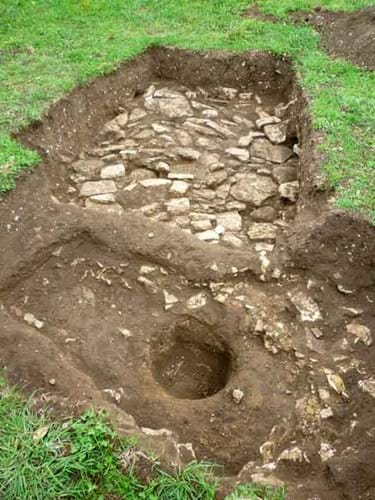
Peter Cox, aged 69, and Darren West, aged 51, both from Northamptonshire, were sentenced by Northampton Crown Court on December 19 to one year's imprisonment, suspended for two years, after pleading guilty to stealing artefacts from and causing serious damage to a scheduled monument at Chester Farm, near Irchester in Northamptonshire.
The case arose as the result of an investigation by a heritage crime partnership involving English Heritage, Northamptonshire Police, the Crown Prosecution Service (CPS) and the British Museum.
The sentences also included 150 hours of community service, a curfew, confiscation of metal detecting equipment, compensation for damage caused to the scheduled monument, and Anti-Social Behaviour Orders that restrict use of metal detecting equipment.
Mike Harlow, Governance and Legal Director of English Heritage, said: "The sentence today sets an important watershed in the combat against illegal metal detecting and acknowledges its true impact on society."
The scheduled monument at Chester Farm, owned by Northamptonshire County Council (NCC), includes Iron Age and medieval settlement remains but is most significant for its surviving remains of a Roman walled town that includes roads, temples and many other buildings. The site has long suffered from trespassers, and a Grade II* listed 16th and 17th century farmhouse on the site was seriously damaged by arson in 2010.
Northamptonshire Police launched an investigation after two English Heritage officers witnessed the two men metal detecting at the scheduled monument last July. Damage had also been caused to the scheduled monument by the excavation of trenches, which had been illegally dug in search of artefacts.
The police quickly arrested the men and raided their homes. A large amount of Iron Age, Roman and medieval coins, metal artefacts and pottery, along with metal-detecting equipment and documents relating to the scheduled monument, were recovered.
Experts from the British Museum helped to identify and date the archaeological finds. English Heritage submitted a heritage impact statement that highlights the national importance of the site and the irreversible damage caused by Cox and West.
"These are not people enjoying a hobby or professionals carrying out a careful study," said Mr Harlow. "They are thieves using metal detectors like a burglar uses a jemmy. The material they are stealing belongs to the landowner and the history they are stealing belongs to all of us. Once the artefacts are removed from the ground and sold, the valuable knowledge they contain is lost forever."
Mr Harlow added that "this is a notoriously difficult crime to prosecute and convict", a factor that may explain why there has been no similarly successful prosecution before in the decade that the scheme has been fully operational.
Mark Holmes, senior crown prosecutor and heritage crime co-ordinator for CPS East Midlands, said: "This practice of illegal metal detecting and stealing artefacts from the ground has been a growing problem, which the CPS takes seriously. Often carried out by so-called 'enthusiasts', this kind of activity has retained a veneer of respectability which it just does not deserve.
"Land is being damaged; the theft of ancient artefacts robs us of important information about our heritage and the artefacts themselves are lost to the public.
"This case is the largest-scale operation we have prosecuted for this type of crime. It should serve as a warning to anyone else involved in this activity that it is a crime and if you are caught you face prosecution and a criminal record.
"The CPS will continue to work closely with our partners in preventing heritage crime and ensuring perpetrators are brought to justice."
The Portable Antiquities Scheme, funded by the Culture department, encourages the voluntary recording of archaeological objects found by members of the public in England and Wales.
Properly reported finds made by detectorists who have secured official permission to search by landowners can be rewarded, with the finder and landowner sharing a payment of the market value of what has been found.
The scheme was piloted after the passing of The Treasure Act, which replaced the medieval law of Treasure Trove in 1996, and acknowledges the importance of retaining items in context, allowing experts to build up a picture of the historical and archaeological setting of finds.




